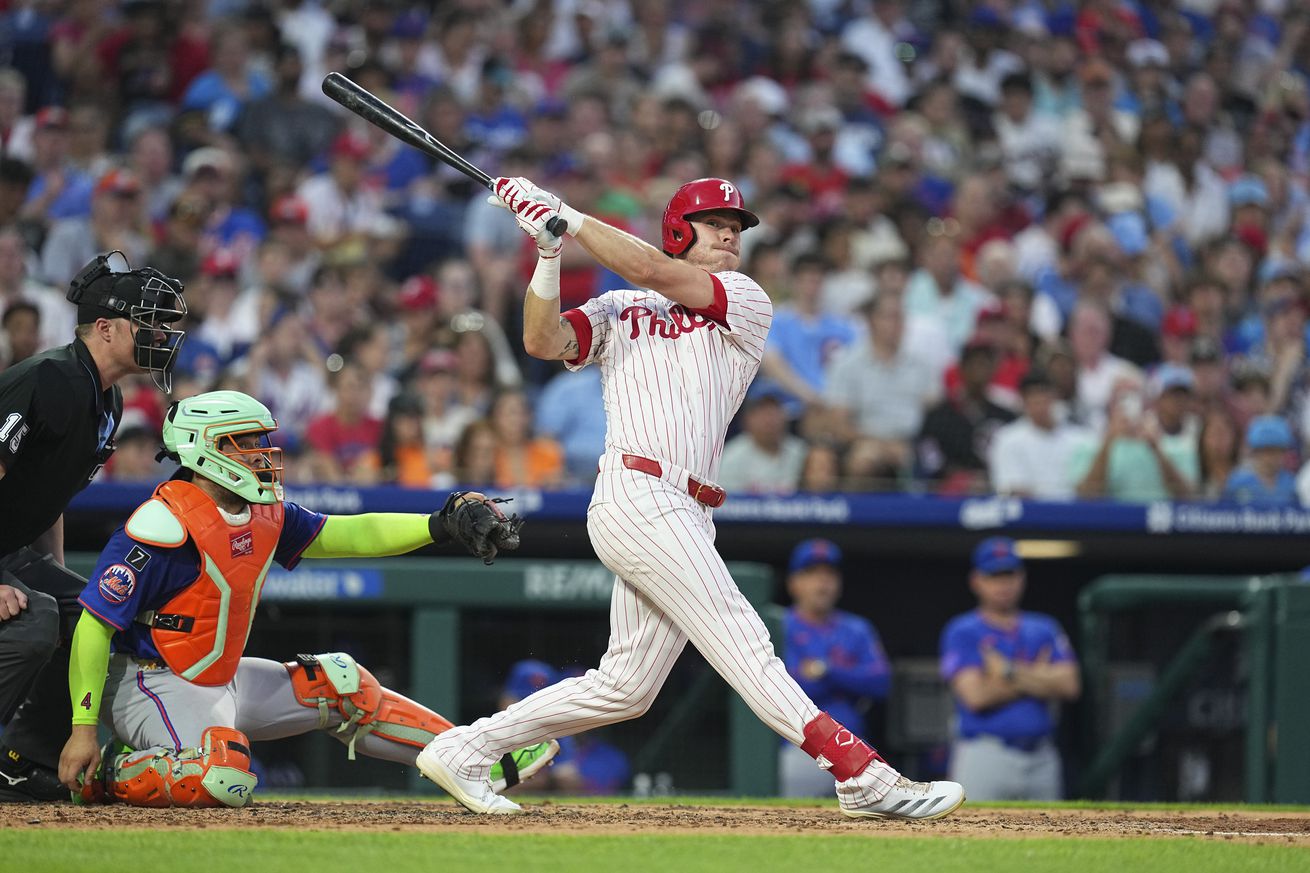
…but maybe try hitting the ball
When a talented team is playing well, there is little to no consternation that leaks out into the public sphere. When a talented team doesn’t play well and scores one run across three games, well then maybe a few of those complaints that fester quietly in the clubhouse are spoken out loud.
On Thursday, Matt Gelb published an article about some of the concerns that are still dogging the team even as they sit near the top of the National League at the halfway point in the season. Namely, the outfield still is producing at lower than expected levels while the team as a whole struggles to hit with over the fence power. What stuck out though was that in the article, Max Kepler was quoted as being a bit unhappy with his current role with the team.
“The biggest challenge for me is not playing routinely,” Kepler said after Thursday’s loss. “That’s the biggest challenge.”
Kepler was under the impression he would.
“Yeah,” he said, “I was told I was going to be the starting left fielder.”
On another point, Destiny Lugardo wrote a great piece asking if Kepler had a point in being unhappy with the amount of playing time he’s received against left handed pitching. She raises quite the point when talking about Kepler.
If the Phillies really did promise him in the offseason a chance to establish himself as an everyday player, Kepler is within reason to have a gripe. They gave him two chances in the first week, then pivoted to a different plan before giving him a real run of playing time against both righties and lefties.
Still, he has not performed well enough to be a sympathetic character. The outfield could be a spot where the Phillies look to upgrade at the trade deadline. Another poor stretch from Kepler could jeopardize his spot on the roster. A trade acquisition could push him to either the bench or waivers.
On the one hand, yes, were Kepler promised a starting position with the Phillies and chose to come here as a result of that promise, he’s got a point. Major league baseball players thrive on routine and order, a mindset cultivated over playing hundreds of games in a row from when they’re teenagers to when they’re at the major league level. The nature of the sport demands that they develop, create and maintain a routine that allows them to work under duress and have a short memory that pushes aside failures faster than most people. So yes, there is a bit of sympathy there if Kepler had prepared to play every day only to have the carpet pulled out from underneath him.
But.
The production he has given the team thus far does not warrant the consistent playing time he desires in a starting role.
When signed, Kepler seemed like a strange roster fit, even if the team saw him as a decent bet to bounce back once the surgery he had on his core muscles was fully healed. On a team full of left handed hitters like Bryce Harper, Kyle Schwarber, Bryson Stott and Brandon Marsh, adding a someone who could play the outfield position and hit right handed felt like a better fit. It could have been a case of “there just wasn’t anyone good enough to start” when running down the list of candidates, but the Phillies also gave Kepler $10 million to come here, a sign that he was targeted and wooed to play in Philadelphia.
Had the league been entirely comprised of right handed pitchers, Kepler’s signing would have been a smart one. For his career, he’s hit .241/.325/.448 against right handed pitching, good numbers enough to start for most teams. But those pesky left handed pitchers keep popping up and for his career, Kepler hasn’t really done well against them (.221/.291/.362 v. LHP). Those kind of numbers don’t exactly scream “platoon outfielder”, but they don’t slam the button down on someone that can be trusted. At best, with that kind of career production and the above average glove he brought with him, the team likely saw him as a player they could slot in the sixth or seventh spot in the lineup on most nights, likely needing a caddy against tougher southpaws, who could play defense at an acceptable level.
Pretty much the role has now.
Yet Kepler isn’t happy about that. He wants more playing time, as all players do. To which we can say, “Prove it.”
Were he hitting better against any kind of hitting, perhaps that conversation could be warranted. Yet a .687 OPS overall isn’t the kind of thing to put forward when campaigning for more playing time.
However, the outfield situation the team finds itself in doesn’t really mean that giving Kepler more run, even against left handers, is entirely out of the question. Whoever has been the starter against left handers in left field hasn’t done much either. Maybe giving Kepler some more consistent time, regardless of who is the mound, will help steer the club’s thinking as the trade deadline approaches. If he gets hot enough, maybe that’s another spot on the roster they can worry about a little less when it comes to prioritizing needs at the trade deadline.
The bottom line to all of it is simple though: if Kepler wants to play more, he needs to hit. Do that and everything should take care of itself.